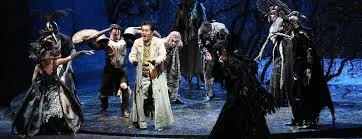Funny Opera Moments
Operas aren’t all about sad music, singing, and grief-stricken tones. Funny moments, too, happen in operas.
You may be an opera enthusiast and love the music, drama, and costume, and the wonderful singing. But operas are not always serious. It is common for opera plots to suffer from funny moments or have deliberate comic plot turns.
Here are some of the funny opera moments that would surely delight you.
From Act I of Die Zauberflöte by Wolfgang Amadeus Mozart
Funny moments in operas are common.
While attempting to escape from Sarastro’s temple, Papageno and Pamina come face to face with the notorious Monostatos. Suddenly, Papageno starts to play a lively dance tune on his mystic bells, the tunes of which are generated from the glockenspiel. The music does its work. Monostatos’s anger disappears promptly, and he dances away cheerfully, singing along with his assistants. As they vanish, Papageno and Pamina agree that the magic bells have the power to eradicate the ills from the world.
From Act I of L’elisir d’amore by Gaetano Donizetti
Nemorino has bought an ‘elixir of love’ from the fake physician Dulcamara Dulcamara after hearing about its power. He plans to drink the elixir of love only for his bellowed Adina so that she can fall in love with him within 24 hours.
As he gets high on the wine, Nemorino experiences joy. As Adina enters the scene, he acts as if he hasn’t seen her, and starts to sing the song ‘la-ra-las’ supplemented by jamming strings. Donizetti funnily juxtaposes Nemorino’s mute tune with Adina’s rising annoyance, as she struggles to have him notice her and – for once – is snubbed.
From Act II of Die Meistersinger von Nürnberg by Richard Wagner
The finicky clerk Sixtus Beckmesser tries to regale the gorgeous Eva Pogner; however, the cobbler Hans Sachs continuously disturbs him. Saying he has to polish Beckmesser’s shoes quickly so that he has no problem attending the singing competition the next day, the cobbler strikes each of Beckmesser’s performance mistakes with a severe blow of a hammer.
Wagner then cunningly juxtaposes Beckmesser’s portentous song –complemented by wavering mandolin and crammed with fancy embellishment and tongue-tied poems – with Sachs’s dull remarks. And finally, it becomes apparent that Beckmesser was hitting on the wrong girl.
From L’Heure espagnole by Maurice Ravel
Not all operas are serious. Many operas involve funny moments.
Concepcion has set a date with the poet Gonzalve at a time when her old husband Torquemada is out of town. However, things are not working in her favor. The muleteer Ramiro constantly interrupts her, saying he wants his watch fixed. She has to get rid of him anyway. And when Gonzalve finally arrives, he seems more involved in uttering sumptuous poetry than doing romance. This leaves Concepcion unimpressed. She tries to get Gonzalve laid, but her efforts don’t affect him.
From scene 3 of Le Grand Macabre by György Ligeti
The dingy harvester Nekrotzar decides to demolish the world at nighttime. To accomplish the task, he hires astronomer Astradamors and Piet the Pot - the wine taster. Piet and Astradamors ask for a final wine party. As they get high, they start to dance around Nekrotzar, yelling and making fun of him in a folksong-like jingle, and instructing him to drink wine.
At the start, Nekrotzar speaks arrogant apocalyptic phrases in loud tones. However, soon, the smell of the wine lures him, and the music melts into a trio, with rhymes and throbbing beats. Astradamors and Piet don’t stop ridiculing Nekrotzar as he angrily keeps galloping the wine, supplemented by loud instrumental hiccups.
As the scene continues, chaos sets in, and the crazy chief of the secret political police arrives.
From Offenbach's Tales of Hoffman
Funny moments in operas also happen due to mismanagement and blunders. This happened with Offenbach's Tales of Hoffman. A wicked wizard takes control of the beautiful and young damsel, having her sing continuously without any mercy for her life. As the magician enters the young woman’s salon, a green-tinted light foreshows the scene.
The magician and the bizarre light were an excellent combo until towards the end of the story when the music brimmed up, the basso sound emerged, and the light broke. The evil magician was invisible.
The audience watched with interest as the sound went across the stage behind the dark curtain. The music didn’t stop, but the evil voice of the wizard somehow stifled. The green light persistently pointed at the entrance for several minutes, after which it was dithered, lowered, and quenched. But the voice was continuously heard behind the drapes, gaining pitch and approaching the doorway. The light turned on, but the evil wizard was nowhere to be seen.
The light dimmed again. And the same scene was repeated, with the audience waiting in anticipation. This time, the voice of the wizard was numb at the start and then abruptly increased as he entered the stage with full glory. The audience sighed finally.
Other Funny Opera Moments
· Beethoven's Fidelio featured an utterly funny opera moment when he entered the stage in cross-dressing. Mozart's Così fan tutte also featured the same. But not everyone in the audience noticed it in both cases.
· Ever seen a helicopter in an opera? Well, Karlheinz Stockhausen's Mittwoch Aus Licht is notorious for its helicopter stunt. It appears to be quite reasonable since you might have seen operas featuring live Bactrian camels.
· While Janacek's The Cunning Little Vixen has been endorsed as a sheer social satire that revolves around the social class system; however, that does not justify the idea of using a woodpecker to perform a marriage ceremony.
· In the delightful concluding moments of Francis Poulenc's Dialogues des Carmelites, nuns are cured of their habits with sound effects.
· A funny scene in Julius Benedict's Lily of Killarney when one of the lead characters is mistaken for an otter and shot.
· The opening act of Der Freischutz features Maz win over his bride by shooting an eagle with magic bullets.
Conclusion
Operas are known for their dramatic work with music and singing as a leading role. Stories in opera are put into play with the help of poetic verses. However, not all operas are serious in nature. Many operas involve funny moments that leave the audience in laughter, as is apparent from the funny opera moments recounted above.
Other articles of interest


